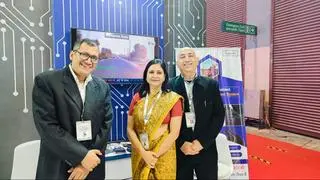Apart from its focus on biotechnology, healthcare and ICT, the Technology Business Incubator at the Hyderabad campus of BITS Pilani plans to incubate start-ups in the niche MEMS (Micro electro-mechanical) devices space. The incubator is setting up a 2,700 sq ft MEMS lab.
Surya Rao, Managing Director, Technology Business Incubator, says there may not be entrepreneurs immediately in the MEMS space, but the institution wants to develop an ecosystem around it. The MEMS lab will help design miniature and precision components that go into various devices. The idea is that over time there will be enough start-ups in this space so that the miniature components that are now imported will be locally made.
Facilities at the campus The TBI at the Hyderabad campus has 2,000 sq ft space to incubate biotech start-ups while a 1,200 sq ft healthcare ICT incubator and the MEMS lab are being set up. Besides, the incubator has 5,000 sq ft of office and common facilities.
According to Rao, the incubator provides space for 13 start-ups though it can accommodate up to 20. The two-year-old incubator admits five to six start-ups every year. Start-ups in the biotech space are allowed to be in the incubator for 30 months, and those in the healthcare ICT space for 18 months and the technology ones for 24 months.
He said TBI’s ₹2 crore seed fund had just been approved and it will start investing in start-ups shortly. The incubator will invest up to ₹ 25 lakh in each start-up; this may not be in the form of equity alone, but can be through a soft loan. The equity will be structured in such a way that the TBI’s stake will get valued when the start-up raises its next round of funding.
TBI picking up a stake in the ventures will depend on the amount of work that the incubator has to put in to get the start-up going; whether the incubator has helped the start-up get funding; and, whether the start-up is based on BITS technology.
Admission norm The criteria for selection for admission into the incubator include validated unmet need, team and willingness to engage with the BITS ecosystem. Admission is open to even those start-ups that do not have a BITS connection, although engagement with the faculty and the possibility of hiring students as interns will be considered.
Rao said investors such as Unitus, Parampara, Hyderabad Angels, Sequoia, Blume and Tata Capital have strong BITS connections. The mentors who will be available to help start-ups at the incubator include alumni who are now successful entrepreneurs, faculty, biotech and ICT industry veterans from Hyderabad, and faculty from the University of Massachusetts; Rao’s previous stint included technology commercialisation at the University of Massachusetts.
Rao said TBI would prefer to focus on idea validation help, customer introductions and targeted mentorship.
“We are only about two years old and are some distance from having successful incubatees. xBITS (low-cost UTI and diabetes diagnostics) is about to launch in a big way. GeneSys (microbial-origin therapeutic products) has a great team and is well funded. We expect them to make it big soon,” he said.
On the start-up scene in the country, Rao says it is self-organising at this point. “Chaotic and immature markets tend to provide several short-lived opportunities. We see too many ride sharing, grocery shopping, food delivery ideas, most of which will die out. Therefore, frothy companies based on unclear value or short-lived markets will die out.”
There are some hardware start-ups, but the problem is the lack of a strong tech base. “We mostly lack a strong hardware/electronics culture. We are also encouraged to see the sudden profusion of makerspaces (a workspace where people with similar interests can meet and collaborate) all over India. I would like to see more organised efforts towards problem validation and design thinking at these makerspaces,” Rao added.








Comments
Comments have to be in English, and in full sentences. They cannot be abusive or personal. Please abide by our community guidelines for posting your comments.
We have migrated to a new commenting platform. If you are already a registered user of TheHindu Businessline and logged in, you may continue to engage with our articles. If you do not have an account please register and login to post comments. Users can access their older comments by logging into their accounts on Vuukle.